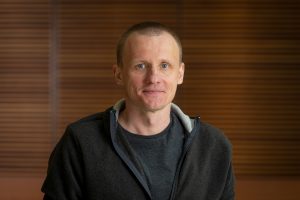This post is modified from one originally published by the Office of the Vice Chancellor for Research and Graduate Education

Physics professor Alex Levchenko was one of thirty-five of the University of Wisconsin–Madison faculty to be awarded fellowships from the Office of the Vice Chancellor for Research and Graduate Education for 2023-24. The awardees span the four divisions on campus: arts and humanities, physical sciences, social sciences and biological sciences.
“These awards recognize our faculty research, academic and outreach successes and provide an opportunity for continued development of their outstanding research programs,” says Steve Ackerman, vice chancellor for research and graduate education. “I’m grateful that we are able to recognize invest in these faculty in this way, and I look forward to seeing the results of their imaginative use of these funds.”
The awards are possible due to the research efforts of UW–Madison faculty and staff. Technology that arises from these efforts is licensed by the Wisconsin Alumni Research Foundation and the income from successful licenses is returned to the OVCRGE, where it’s used to fund research activities and awards throughout the divisions on campus.
Eighteen faculty, including Levchenko, have been honored with the H.I. Romnes Fellowships to recognize faculty with exceptional research contributions within their first six years from promotion to a tenured position. The award is named in recognition of the late WARF trustees president H.I. Romnes and comes with $60,000 that may be spent over five years.
Levchenko studies fundamental aspects of condensed matter physics with a focus on electronic phases of matter and quantum transport. Specific areas of expertise include superconductivity, topological order, and nanoscale systems such as graphene and other van der Waals materials. He is a Fellow of the American Physical Society and of the Alexander von Humboldt Foundation, and recipient of an early career grants from the National Science Foundation and the Binational Science Foundation. His teaching covers all levels of undergraduate and graduate education, and he serves on multiple professional review panels internationally.